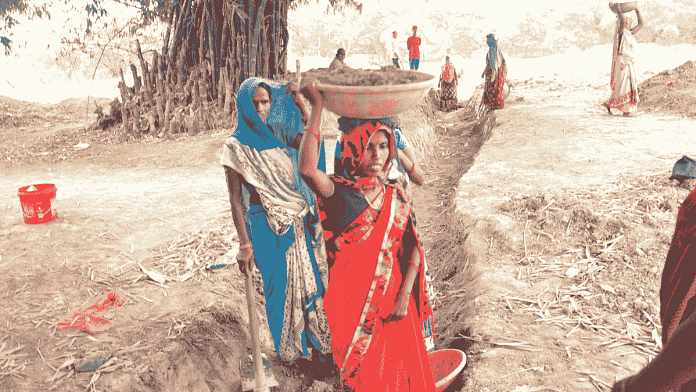New Delhi: The Narendra Modi government at the Centre has decided to make Aadhaar- based payment system (ABPS) mandatory for settlement of wages to workers under the Mahatma Gandhi National Rural Employment Guarantee scheme (MGNREGs) from 1 September, ThePrint has learnt.
Two senior officials in the rural development ministry said the ministry has decided against extending the deadline beyond 31 August. The deadline had already been extended three times in the past.
“A meeting was held with all state governments regarding the status of ABPS. We have informed states that the deadline will not be extended further so they will have to complete the process of implementing the ABPS in the next few days,” said a senior ministry official, aware of the development.
A week before the deadline ends, close to 19.4 percent or 2.77 crores of active NREGA workers are yet to be linked to ABPS, according to the data available on the Mahatma Gandhi National Rural Employment Guarantee Act (MGNREGA) portal Thursday.
Activists term the government decision “illegal” and say it will only result in more job card deletion and poor people being denied work. The NREGA Sangharsh Morcha, a national platform of workers’ collectives, organisations and individuals engaged in public action on NREGA, has called a meeting Friday to discuss the issue. Members say they will write to the ministry in this regard.
“Twenty percent of over 14 crore workers are still not eligible for payment through ABPS; it is a huge number. Preventing payment of wages is illegal, according to the MGNREGA. The 2005 Act says that anyone who demands work must get work,” said labour activist Nikhil Dey of the Mazdoor Kisan Shakti Sangathan (MKSS) and NREGA Sangharsh Morcha.
According to ministry officials, workers may not be eligible for ABPS if their Aadhaar is not linked to their job card and bank account and further to the National Payments Corporation of India (NPCI). This may be because Aadhaar authentication has failed or if bank accounts have not been mapped to the NPCI.
The Narendra Modi government introduced the ABPS in 2017 in a bid to ensure “timely payments of wages” to NREGA workers and also make the payment system transparent. Under the new system, a worker’s Aadhaar number is linked to a bank account, which in turn is connected to NPCI.
On 30 January this year, the government issued an order making the system compulsory from 1 February. Following repeated requests from various state governments, the rural development ministry extended the deadline to implement ABPS thrice — first to 1 April, then to 1 July and finally to 1 September.
ThePrint has reached the ministry for a comment on the allegations made by the activists via WhatsApp. This report will be updated once a response is received.
Also read: Expert panel calls for ‘immediate’ registration & possession for homebuyers despite builders’ ‘dues’
Many may not be able to meet the deadline
There are 14.41 crore active NREGA workers (those who have done even one day of work in the past three financial years) of which 11.60 crore are ABPS eligible, as on Thursday, shows the MGNREGA portal.
While the Centre has decided to make ABPS mandatory, officials in the rural development ministry told ThePrint that states say they may not be able to meet the deadline.
A senior ministry official claimed, “Assam, Arunachal, Meghalaya and Nagaland are the states lagging behind. We have told state governments to expedite the process.”
According to the MGNREGA portal, in Meghalaya and Nagaland just three percent and 20 percent of total active workers are eligible for ABPS, respectively. Other states where ABPS linkage is below 70 per cent include Assam (38.3 percent) and Arunachal Pradesh (62.1 percent).
Kerala, Andhra Pradesh and Tamil Nadu are the only three states where more than 95 percent of the active workers are eligible for ABPS, according to the portal.
Even states such as Madhya Pradesh, Rajasthan, Uttar Pradesh, which have a large number of active NREGA workers, the percentage of ABPS eligible workers is between 72 and 85.
Activists say that the Centre’s push for the 1 September cut-off will only result in more workers being denied work and deletion of their job cards.
“This will only result in deletion of job cards and people being denied work. For instance, if one person is not eligible for ABPS payment then the payment of the entire muster roll (which has 10 people) will get affected. The payment is released for all 10 in one transaction. Therefore, those without ABPS authentication will not be given work. Because of this reason, job cards of so many people have been deleted in the past few years,” said Dey.
In July, the rural development ministry informed the Lok Sabha that 5.18 crore names of workers were deleted from the MGNREGS list in 2022-23, against 1.49 crore in 2021-22.
In a written response to a question by Congress MPs V.K. Sreekandan and Gaurav Gogoi, Rural Development Minister Giriraj Singh said the reasons spanned from the death of workers to “fake job cards”.
The deletion of an MGNREGS worker from the rolls basically means that the person is ineligible to work as he is no longer registered under the rural job programme. Under the scheme, every eligible household is given a job card, which entitles its willing adult members to 100 days of work a year.
(Edited by Smriti Sinha)
Also read: 13.5 crore lifted out of poverty are now ‘new middle class’, says Modi in Independence Day speech



